
by Purnima Ramakrishnan | Apr 22, 2014 | 2014, Awareness, Brazil, Environment, Human Rights, Humanitarian, Purnima, Social Good, Water, World Moms Blog
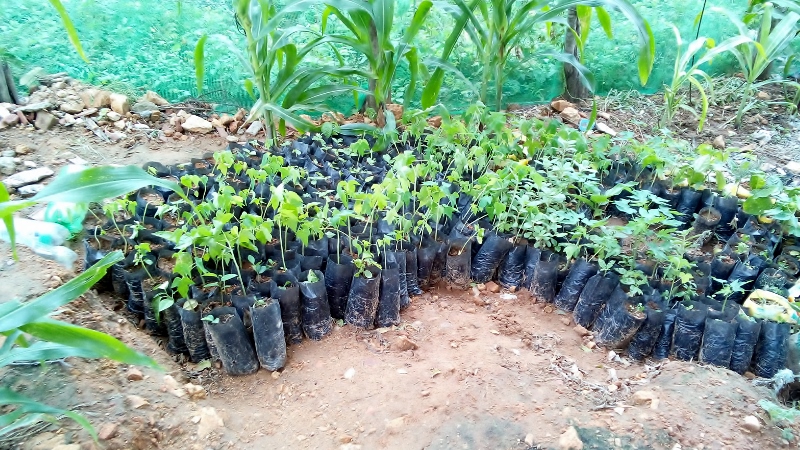
Photo of Celia’s saplings by Purnima Ramakrishnan
“Universal access to water is a right to all and now it is just on our doorsteps” said farmer Celia. I was traveling as a International Reporting Project Fellow, and we had just arrived in the semi-arid city of Cumaru, in the North-Eastern state of Pernambuco.
We had lunch at Joelma’s place who is a farmer in Cumaru. She made delicious rice, palma salad with lots of vegetables in it (a variety of sustainable cacti, native to the lands and which is used to feed both livestock and people). And then we went to her sister-in-law, Celia’s farm. Celia is also a farmer.
When Celia was six years old, she used to go downhill and carry water back up to her home in pots and buckets, and she recalls them being very heavy. When she cajoled her father, he sometimes let her use a donkey to bring it back home. This, the six-year-olds woke up at 3 AM every day to do. I have an 8-year-old at home, and I cannot imagine giving him such a life.
Today though, she is grateful that she can give her own two-year-old, a better life, thanks to the Cisterns project.
The average rainfall in these semi-arid lands varies from 200 to 800 mm, which is very irregular for habitation. Moreover, the amount of evaporation in these lands is three times higher than the rainfall. Hence it becomes even more important to capture the rainwater for families during the dry season. This is the concept of the Cisterns project.
The ASA (Articulation Brazilian Semi-Arid) is a network of social organisations operating in the Northeast of Brazil which aims to “empower civil society to build participatory processes for sustainable development and cope with the semi-arid land based on cultural values, and social justice.”
ASA was born from accumulated experience of organisations and social movements that have worked for years in the perspective of living with the Semi-arid climate. In 1999, the ASA presented a joint project for the Semi-arid to the society and the government, and thus the Articulation became a network.
In 2003, ASA launched P1MC (Program One Million Rural Cisterns), which aims to build 1 million water reservoirs to meet the needs of 5 million families. Currently there are 500 thousand reservoirs and the program has graduated into a public policy adopted by the Federal Budget.
These water reservoirs or cisterns are of two types. Every family has cisterns with a capacity of 16,000 litres of water for domestic use and another of 52,000 litres of water for farming and livestock use. The technology employed here is called social-technology and basically collects water from the rooftops and harvests the rainwater. The families are given a course in water management and are also requested to take a course in farming in semi-arid.
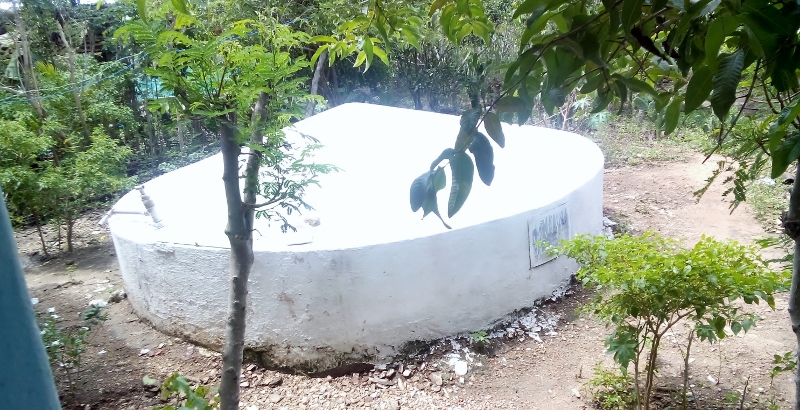
Photo of a 16000 litre cistern by Purnima Ramakrishnan
Celia says, she is now employed and this has brought about female empowerment along with water, and agriculture, all because of the cistern on her doorstep.
She cultivates small saplings and sells it to the other farmers. She grows corn, papaya, oranges, tangerine, beans, cashew, Umbu, tamarind, and many other things. She also sells the produce (though now too much) in the market and to other farmers. Her husband works in construction department in the town, whereas she lives in the village doing her farming with her two-year-old. She hopes to give a better life to her son.
She has been taught in her course to cultivate three types of plants, she says. The first is the native plants which thrives well on the soil of the area with not much dependency, and is more suited to the semi-arid climate like the Umbu. Then the plants which are not suited to the area, like corn, for which abundant water is available from the cisterns. And the third type is the plants for the livestock like Palma. This ensures that the plants give back to nature what they take from it. The soil gets enriched and also nurtures the plants. It is a two-way process.
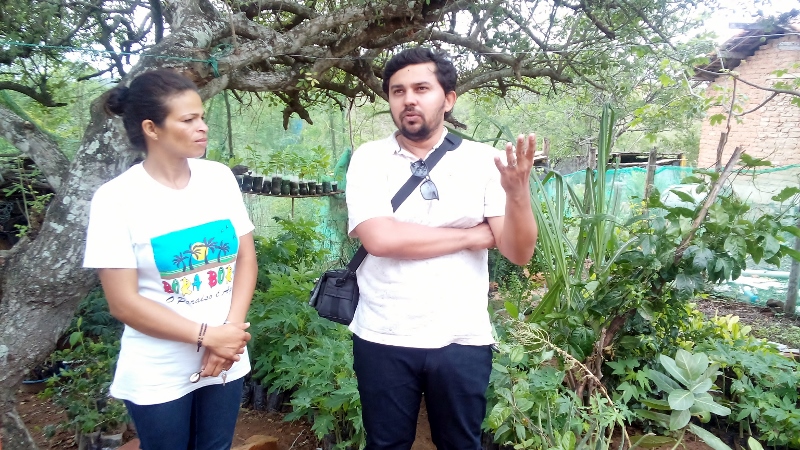
Carlos-explaining-about-the-cisterns-and-farmer-Celia-looking-on Photo by Purnima Ramakrishnan
This seed of change stimulated by social organisations that operate in the region have prompted the development of coexistence of half-barren lands with practical goals absorbed by the government to promote sustainable living.
We asked Carlos, the program coordinator of ASA in the region, “Is this a solution for food security?” He said it is much more than that. It is a solution for independence, female empowerment because of employment in one’s own farm, it is a way to make the semi-arid a much greener place to live, it is a solution to democratize water, and make it a universal right, not a consumer product.
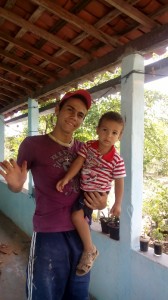
Celia’s son and nephew, Photo by Purnima Ramakrishnan
I remember that water was more expensive than beer in my hotel. And I now knew why! One should not pay to have to drink water, he said.
This concept can be embraced in many developing semi-arid regions.
On this Earth Day, let us pledge to make our cities greener and conserve water. Let us spread such buds of change through social media, and other channels.
How do you plan to honor this Earth Day?
This is a post written by Purnima Ramakrishnan on her #BrazilMDGs trip to Brazil as a fellow of Journalism with the International Reporting Project.

by Purnima Ramakrishnan | Apr 11, 2014 | 2014, Brazil, Human Rights, Humanitarian, Humanity, Purnima, Social Equality, Social Good, The Alchemist, World Moms Blog, World Voice
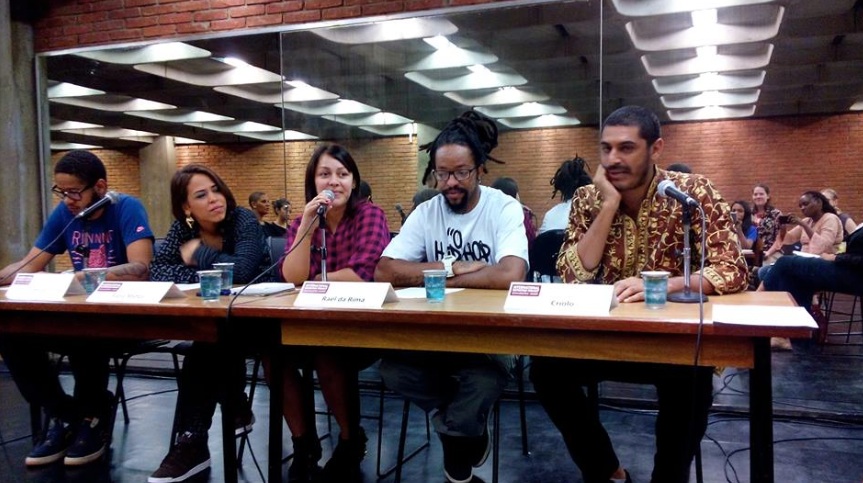
Centro Cultural Sao Paulo
Our visit to Sao Paulo with The International Reporting Project was coming to a close. After a very hectic day of Community heath visits and chatting with doctors, nurses, and community health workers, we just had to do something very cool. And what nicer thing than to rap our way into it?
We met the awesome International acclaimed Brazilian rap group at Centro Cultural Sao Paulo, and it was a great honor to be in their presence.
In the 1990s a musical style known as rap consciencia (socially conscious rap) originated in Brazil. These days it is making huge waves and improving the lives of people by making them socially conscious of their choices, their lifestyles, rights, issues, and gently coaxes them to dream of things which generally are taboo to dream about, for the Afro-Brazilian ethnicity.
Criolo was 11 years old when he started writing lyrics and now he has chart busters in London, New York and Paris. At the tender age of 11 he wrote about social issues. Social inequality is a major problem in Brazil. There is still prejudice across Brazil.
Criolo said, “there are so many ways to live. To wake up, to eat, to get to work and then get some money and then to eat again, is one way. If that is to live, it means people sell themselves for some food and money. That is just a process. Stop it. Live life. Let us talk about ourselves, our passions and aspirations and our joys.”
Rael da Rima was 11 when his music band used to talk about social injustice, racism, and equality to all. He talked a little bit about his personal life, and how rap music changed his life, and the lives of people living around him.
He said, “I give you an analogy for the social inequalities in Sao Paulo. Some people use this mineral water (indicating the drinking water on the table) to wash their BMW cars, and yet some do not have access to clean drinking water. Sao Paulo is a city of extreme contrasts. I sing so that people consciously become aware of their own lives and strive to improve it.”
Rael singing of his passion for rap music:
Emicida says, “When I was young, to get into college was not something youngsters would think about. Just to let the day go by was an accomplishment. Nowadays when I walk through the favela(slum) I grew up in, I am so happy to see the youngsters talking about their dreams of being in college and to get a ‘real’ job. When slavery was abolished, it was both a curse and boon. A curse because people were pushed into poverty and violence with no support system, a lot of confusion, and no real understanding of what was happening in society or the political and economic scenario of the country. My rap is to inspire people to talk about their dreams, how to get out of social inequalities and to be truly free. In everyone there is a human being and I wish for each one to know it. Through rap music, the magic of communication is established, and people are inspired to know themselves as such.”
Emicida singing for World Moms Blog
Flora Matos was 18 when she decided to move to Sao Paulo from Brasilia. She sings so people are free of sexual prejudice. She says her music always speaks of love – love for all kinds of people – love for humanity as a whole and breaking anything which could make people hate each other.
Flora Matos singing of love – love for people, passions, and love for all of humanity
These musicians and others like them are not people who sign on big labels or crave all of the fame and popularity. They just want justice, recognition of the minorities as human beings, and some peace for their community. And they do it through rap music.
They sing about poverty, prejudice, abuses of various types, about the blacks and whites in Brazil, and the classes. Flora said, all her numbers are characterized by experiences, either her own, a friends or someone she knows about. So this idea of communication which Emicida says – that is the magical bond – is established. This communication through music is not just passing of information or ideas or activism – it is an expression to bond humanity, a gentle prod to awake, and be aware. So through the actual performance the listeners carry back this vital element of being part of the movement.
So even though they do not directly change anything, or may not be able to give statistics and figures, they change attitudes, and invest in developing agents of change – which is a very vital thing to forge a developing society, progressing towards success.
I am not a big fan of music, not even Indian music, but that day I promised Criolo I would look him up on Youtube. He was mildly surprised to know that I came for a meeting with rap artists when I was not into music at all. I explained that it was because I learnt they worked for social causes through music, and I was interested in that. He wished me luck and said he would look up World Moms Blog too and we parted.
Just for fun, I also recorded some street musicians the other day in Sao Paulo’s Avenida Paulista, one of the poshest locality in Sao Paulo. I cant help sharing the below one.
This is an original post to World Moms Blog by Purnima Ramakrishnan, our Indian mother writing from Chennai, India. Her contributions to the World Moms Blog can be found here. She also rambles at The Alchemist’s Blog.
Photo credit to the author.
Purnima Ramakrishnan is a fellow of Journalism with the International Reporting Project (IRP), reporting from Sao Paulo, Brazil. Follow on Twitter at #BrazilMDGs

by Purnima Ramakrishnan | Apr 8, 2014 | 2014, Brazil, Health, Humanitarian, Purnima, The Alchemist, World Moms Blog
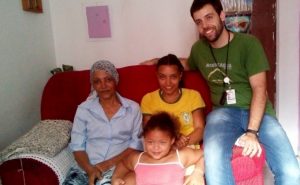
Raimunda with her family and Dr. Rodrigo D’Aurea from the Community Health Center
Raimunda is a 46-year-old mother to two beautiful daughters aged 19 years old and 7 years old. She sadly has lungs cancer, stage-4, has undergone chemotherapy, and now is in palliative care. Her family physician, Dr. Rodrigo D’Aurea took us to her house yesterday in a locality called Boa Vista in the suburbs of Sao Paulo which has a population of 20,000 people. She was diagnosed almost a year and half ago and she was already in stage-4. She has a very aggressive form of lung cancer. She used to smoke a long time ago, but has kicked the habit for more than a decade. Her husband used to contribute to the family’s upkeep until her elder daughter was 18 years old, but in the past year, he has stopped doing it. She has some pension from her retirement and she crochets for a living. You can see the beautiful white crochets folded on her couch.
Her doctor says, there are four things he has to take care of – firstly the physiological aspect of her body having cancer, secondly her psychological acceptance, how she deals with it, and accepts it emotionally, thirdly her dependents (here her daughters who will need to be adopted after her time), and fourthly he has also spoken to her priest and arranged for things. It made us a bit sad listening to it, this way. But hold on, there is more to this article. Melody, Julianna (our translator), and I accompanied Dr. Rodrigo D’Aurea and the health care worker on a work visit.
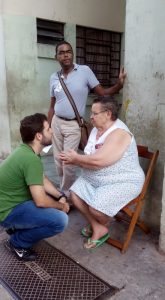
Dr. Rodrigo D’Aurea being greeted by yet one of his elderly patients on the street. The community health worker looking on.
I am here all the way from India as an International Reporting Project Fellow, reporting about the Public Health Center’s community visits. Here, a team consisting of a doctor, a nurse, two nursing assistants, a community health worker visits their patients in their assigned locality (Boa Vista here) and speak to the people and treat them. As we walked along the streets, I could see every resident saying “Ola” (Hi/Hello) and “Tudu Bem” (How are you) to Dr. Rodgrigo. It looked like he was a friend, a son, a brother to everyone whom we passed along in the streets.
The USB (Unidade Basica de Saude) which basically means Unit of Primary Health located in Jardin Boa Vista (Garden of Boa Vista) takes care of its 20,000 residents. It is almost like a hospital with about ten consultation rooms, a dentistry, Vaccination room, first aid and emergency room, a small nurses’ station, and some admin rooms. It is elegant, clean and hygienic. The doctors and health workers cater to not just the medical needs of the residents, but to their emotional and family needs.
Because here social problems have a big impact on the health problems of residents.
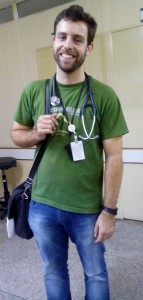
Dr. Rodrigo D’Aurea leaving for the day after giving us a tour of the clinic and the community
Dr. Rodrigo mentioned that he is more like a psychologist, counselor and a family doctor, rolled into one. He knows more about all the residents than anybody else. He feels morally responsible and I could feel the pride in his voice when he spoke about them.
He owns the hearts of the residents, is all I can say.
This Community Health initiative is a wonderful one and it is funded by the SUS. (Sistema Único de Saúde) which means the Unified Health System. It is Brazil’s publicly funded health care system. SUS was created after the Brazilian Constitution of 1988, which assured that health care is a “right of all and an obligation of the State”. Prior to that, only people who contributed to social security were able to receive health care. The creation of SUS was important in the sense that more than 80% of the Brazilian population depend on it to receive medical treatment.
These public health units focus mainly on the family health instead of the health of a single individual. It is interrelated. A family’s social, mental, and emotional well-being is directly related to the physical health of the individuals. It taps into different knowledge and practices from the perspective of a holistic and problem solving approach, enabling the creation of bonds of trust through ethics, commitment, and respect. They have different specialists visiting them often and on request. They also refer cases to different units like oncology, gynecology, and such for detailed assistance.
All the population of Brazil is covered to receive primary health care. It does not matter if you have insurance or not, if you are covered under your social security or not. Brazil is on the road to achieve a 100% health coverage. This is something the other developing nations in the world have to carefully watch and learn from.
This is an original post to World Moms Blog by Purnima Ramakrishnan, our Indian mother writing from Chennai, India. Her contributions to the World Moms Blog can be found here. She also rambles at The Alchemist’s Blog.
Photo credit to the author.
Purnima Ramakrishnan is a fellow of Journalism with the International Reporting Project (IRP), reporting from Sao Paulo, Brazil.

by Purnima Ramakrishnan | Mar 11, 2014 | 2014, Brazil, Humanitarian, International, Poverty, Purnima, Social Good, The Alchemist, Travel, World Moms Blog, World Voice, Writing
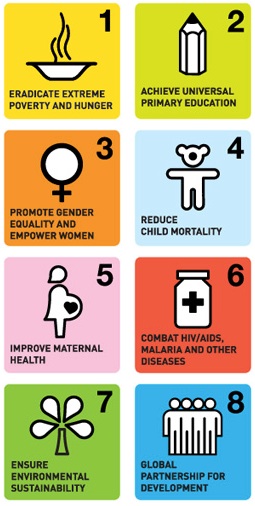
United Nations Foundation
Sometime back I wrote in my personal blog that I am ‘NOT’ a globe-trotting mama. But here I am getting ready for my next adventure all over Brazil.
I am honored and proud to officially announce that I have been selected to receive a fellowship in Journalism and will be reporting from Brazil for the International Reporting Project as part of the John Hopkins School of Advanced International Studies. I shall be reporting about reduction of poverty and hunger in Brazil, and how it has embraced the Millennium Development Goals to improve the lives of its citizens.
Here at World Moms Blog, working for the MDGs has been something close to our hearts. And hence this trip is also very close to my heart where I will be learning so much and sharing what we do here at World Moms Blog through media and through the power of mothers. Having launched the Moms4MDGs campaign in Chicago, during BlogHer13 and following up very closely and working with it has made me feel very passionate about this cause.
As I brace myself for a hectic fortnight in the 2nd and 3rd week of April, where we may go back-packing and camping in rural and sub-urban Brazil, one thought comes to my mind – What is it that I am going to achieve, apart from the learning and all the anticipated fun? I really don’t know that yet.
I only know that this trip is going to be very special in so many ways.
I have written posts about the 8 MDGs in the past about a few topics including Environment, Eco-feminism, reducing Infant mortality rate, child-health, Social issues and empowerment of girl child and women. I now also look forward to learn more about reduction of health, poverty, hunger and improvement of the lifestyle of citizens by the sustained effort of various individuals and organizations.
This trip is going to take me places very rugged and rustic like rural villages where connectivity could be difficult, I understand. It makes me a bit concerned, honestly. Not being in touch with my family, especially my son every single moment is going to be difficult. I leave him in good care and support; however this phase sure will be tricky to cope.
We do not have a detailed itinerary yet, but I know that it is going to be exciting. Exciting? Yes, at times, IRP fellows have also met with Presidents/Prime Ministers of the countries they visit. So, it is just not back-packing and camping and reporting from the villages. It is also meeting with the decision makers and understanding how the entire system works.
Anybody want to guess what came in the mail yesterday? A luggage tag featuring the WMB lady, just in time for my travels. Jen, Thank you! I love this so much and as I pack my bags for Brazil, this is something which will always remind me of the love and comradeship of this beautiful group.
Please look forward to my everyday thoughts and stories, and possibly photographs, video posts, blog posts, slideshows, updates on social networks, assuming I have a good internet connection.
You can track my posts from this trip at #Moms4MDGs.You can track all posts from this trip using #BrazilMDGs.
I will be tweeting from both @WorldMomsBlog and @Puma_Vinod. I will vicariously be posting on Facebook both on my personal profile and World Moms Blog profile too.
Please feel free to ask me any questions and leave your comments about this trip. I would also love to read any of your insights on Brazil.
This is the first of the many posts credited to the International Reporting Project (IRP), as part of my reporting from Brazil on this fellowship.
Photo credit United Nations Foundation.
This is an original post written by Purnima Ramakrishnan for World Moms Blog.
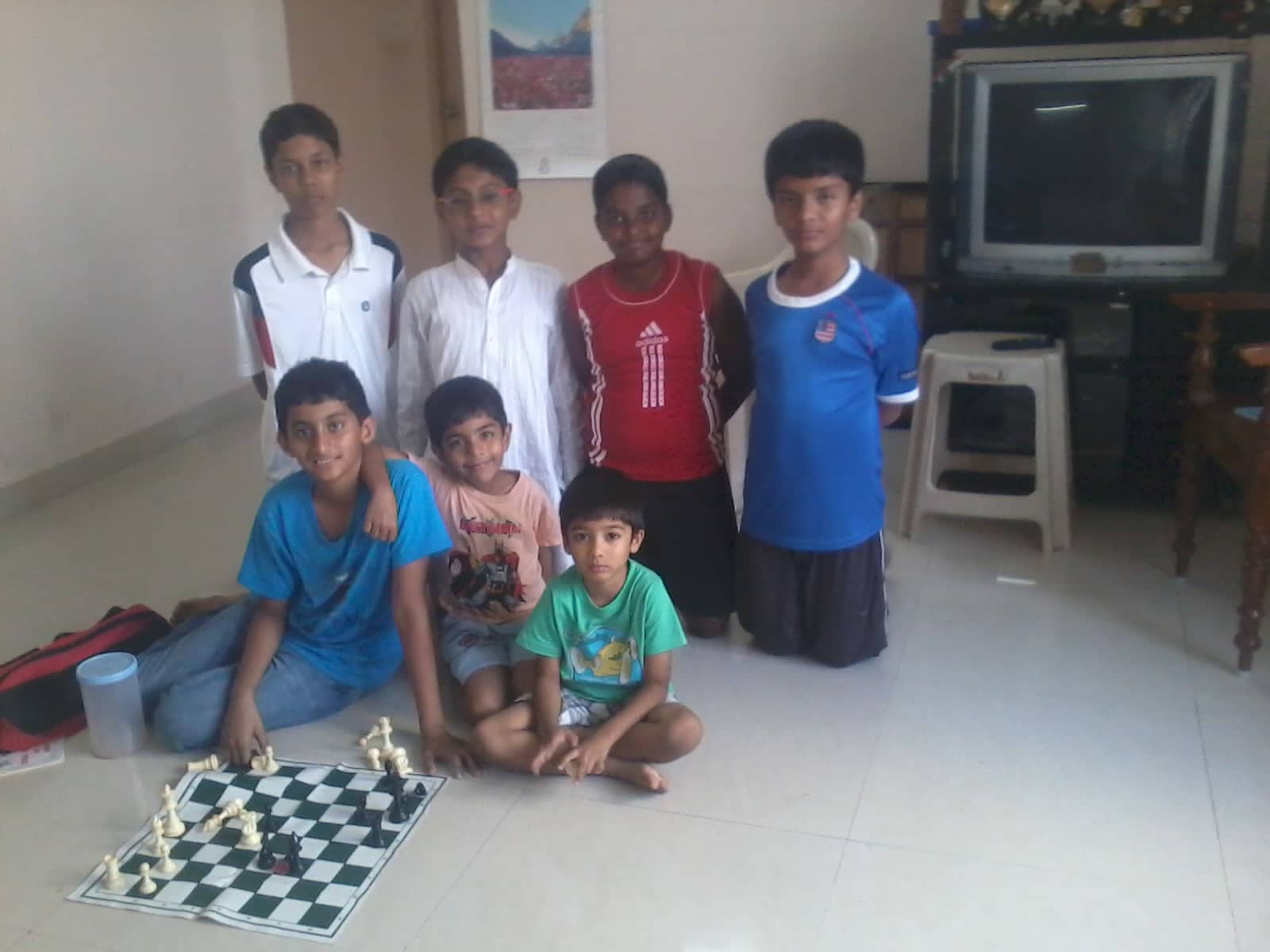
by Purnima Ramakrishnan | Jan 23, 2014 | India, Older Children, Purnima, Sports, The Alchemist, World Motherhood, Younger Children
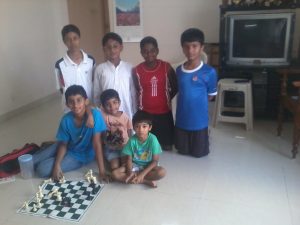
The boys after a game of chess
It all started with one eleven year old boy’s boredom. He wondered how to keep himself occupied in the holidays which were to come the next week. He talked about it to his friend, and they decided to coach the younger kids in their community. And the idea evolved. Today, Ashram Avenue Sports Club, the one in my community which has over 20 kids, some coaches, some students, some both, in various types of sports have joined in the plan.
So, in my community there is a club, started by tweens. They coach the younger kids (aged from 5 to 10) in football, cricket, badminton, chess, art and crafts. They created a website, a Facebook page. They even collected money from all parents, and appointed a treasurer and are keeping balance ledgers. This money is utilized to buy supplies like balls, sport kits, first aid, etc.
There are two adults who are administrators, keeping an eye on everything they do. Once in a while they check the account books, talk to parents and just about do whatever needs immediate attention. My house is the venue for the chess coaching. An empty plot nearby is the ground for the outdoor games. Yes, they sought permission from the plot owner, and he was kind enough to rent it out to these budding idea machines for no cost at all.
So, during the weekend and holidays, they have a schedule which involves all these games with breaks in between.
I am so happy! That is the point of this post.
The parents are happy with this arrangement. There are a lot of problems, too, but everyone likes this idea. And hence, we are constantly evolving and as and when we face any issues, we try to sort it out among ourselves.
No, these kids are not great coaches. They are not training the younger kids to become Olympic Players either. For that, a few other children are enrolled in professional sports schools. But this is for keeping the children happily engaged and in a good and structured manner.
I do not know how long this will last. It has lasted now for about a month. And it has constantly been evolving into something more meaningful and more effective. This is a good community where I am living. Everybody almost knows everybody else. It has its own positives and negatives. But so far the positives have outweighed the negatives.
As a mother, what does this mean to me? Personally, my son was not an outdoorsy type of person. He was more into intellectual things and not into exploring sports and activities. Well, there is nothing wrong in that, because everyone has their own interests and abilities. But this initiative has made him explore sports. He is familiar with all sports but now he is interested in playing, too.
I do not expect him to excel in sports. I only want him to know and understand the joys of physical activity, sports and games. For that I am grateful to these “coach-children” who made this happen.
Has anything special happened in your community which left you mildly surprised and at the same time immensely thankful?
This is an original post to World Moms Blog by Purnima, our Indian mother writing from Chennai, India. Her contributions to the World Moms Blog can be found here. She also rambles at The Alchemist’s Blog.
Photo credit to the author.
























